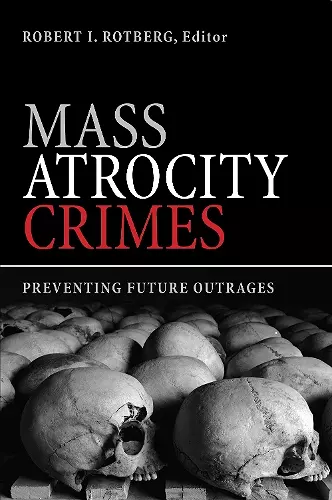Mass Atrocity Crimes
Preventing Future Outrages
Format:Paperback
Publisher:Bloomsbury Publishing PLC
Published:9th Jul '10
Currently unavailable, and unfortunately no date known when it will be back

What can be done to combat genocide, ethnic cleansing, and other crimes against humanity? Why aren't current measures more effective? Is there hope for the future? These and other pressing questions surrounding human security are addressed head-on in this provocative and all-too-timely book.
Millions of people, particularly in Africa, face daily the prospect of death at the hands of state or state-linked forces. Although officially both the United Nations and the African Union have adopted ""Responsibility to Protect"" (R2P) principles, atrocities continue. The tenets of R2P, recently cited in a UN Outcomes Document, make it clear that states have a primary responsibility to protect their citizens from genocide, war crimes, ethnic cleansing, and crimes against humanity. When states cannotor will notprotect their citizens, however, the international community must step into the breach.
Why have efforts to stop horrific state-sanctioned crimes seen only limited success, despite widespread support of R2P? As this enlightening volume explains and illustrates, converting a norm into effective preventive measures remains difficult. The contributors examine the legal framework to inhibit war crimes, use of the emerging R2P norm, the role of the International Criminal Court, and new technologically sophisticated methods to gather early warnings of likely atrocity outbreaks. Together they show how mass atrocities may be anticipated, how they may be prevented, and when necessary, how they may be prosecuted.
Contributors include Claire Applegarth (Harvard Kennedy School), Andrew Block (Harvard Kennedy School), Frank Chalk (Montreal Institute for Genocide and Human Rights Studies, Concordia University), David M. Crane (Syracuse University College of Law), Richard J. Goldstone (Constitutional Court of South Africa; UN International Criminal Tribunals for the former Yugoslavia and Rwanda), Don Hubert (University of Ottawa; Global Center for the Responsibility to Protect, City University of New York), Sarah Kreps (Cornell University), Dan Kuwali (Malawi Defence Force), Jennifer Leaning (Harvard Francois Xavier Bagnoud Center for Health and Human Rights), Edward C. Luck (Columbia University; International Peace Institute), Sarah Sewall (Harvard Kennedy School)
"This is an outstanding collection, jam-packed with good policy ideas about how to prevent mass atrocity crimes. Its basic message is loud and clear: the 'never again' dream will remain unrealized, and the critical new 'responsibility to protect' norm will remain fragile, until key state and intergovernmental actors get their implementation act together. It should be on the desk of every international policymaker, advocate, and scholar working in this area." —Gareth Evans, Cochair of the International Commission on Intervention and State Sovereignty, President Emeritus of the International Crisis Group, and author of The Responsibility to Protect: Preventing Mass Atrocity Crimes Once and for All
|"There are no easy answers to the challenge of preventing atrocity crimes, but Professor Rotberg has assembled in this book a highly talented team of practitioners and scholars to explain the law, politics, sociology, and communications technology that will shape the future. The authors provide cutting-edge analyses of the international criminal tribunals and the 'responsibility to protect' doctrine." —David Scheffer, Mayer Brown/Robert A. Helman Professor of Law and Director of the Center for International Human Rights, Northwestern School of Law
ISBN: 9780815704713
Dimensions: 229mm x 152mm x 17mm
Weight: 367g
266 pages